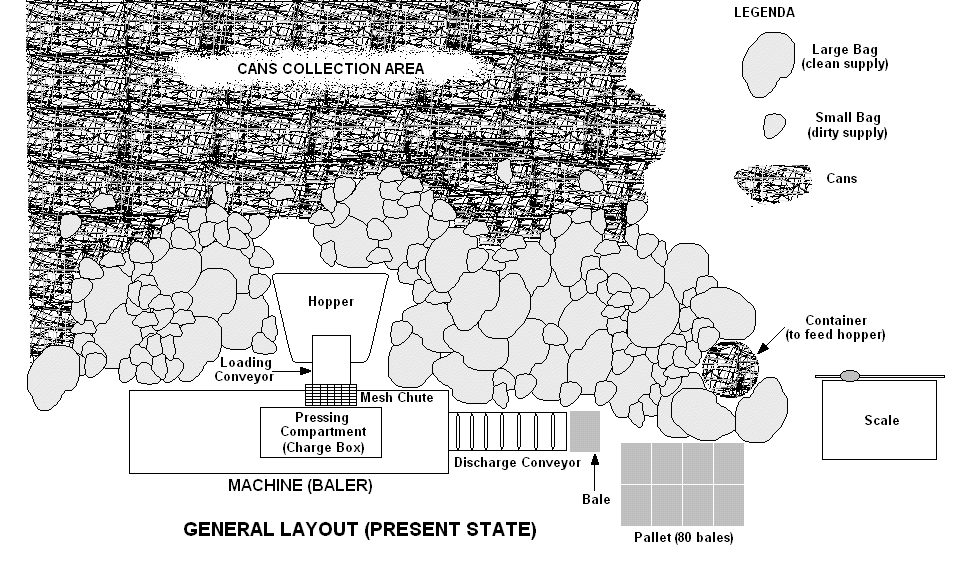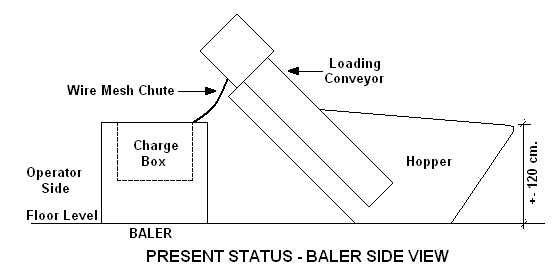|
navigation
consulting
services
training
services
specials
reading
material
resources
|
THE PRESENT STATUS:
A Scrap Yard Business collects and processes scrap cool-drinks-cans for subsequent export.
The scrap cans collection/processing operations consist of the following:
- Scrap cans are actually delivered to the Scrap Yard by a number of "suppliers", including restaurants, hotels, fast-food outlets, small grocery shops and kiosks, as well as "professional" scrap items collectors - they come regularly to the yard by their own means to deliver scrap items.
- Scrap Cans Suppliers are classified into two main groups: the "clean scrap" suppliers and the "dirty scrap" suppliers.
- "Clean scrap" suppliers include restaurants, hotels and fast-food outlets. They are classified as "clean" because their scrap cans are "clean" (from straws - and not mixed with glass and plastic bottles and other non-metal items). This kind of suppliers actually does a "sorting" and separation operation in their premises, and their supplies consist only of cans. For this reason they are paid a premium price per Kg for their supplies.
- "Dirty scrap" suppliers include small supermarkets and kiosks and scrap street collectors (these last suppliers do actually earn their living by collecting cans from street refusal bins). They are classified as "dirty" because their supplies are generally "unsorted" (contents include other objects that must be removed in the scrap yard before processing). These suppliers are paid the ongoing market price for scrap cans.
- "Clean suppliers" generally supply their goods in large refusal bags. "Dirty suppliers" supply their goods in any type of bags (generally small, supermarket-size) and even in cardboard box type of containers.
- Suppliers arrive at the scrap yard at any random time, and their goods are received and paid-for immediately: they drive their vans or trucks straight to the cans processing area - bags and other containers of cans are weighted on a scale - a small paper note, describing items and total weight delivered, is given to suppliers who can then collect their cash payment from the cashier's office on the way out.
- The offloaded goods, still in their bags or other containers, are thrown by hand onto the cans collection area. This area is rather large and extremely messy: there are piles of multi-colour cans everywhere, as well as mountains of bags still to be opened. A map of the area is below.

- There are 3 workers assigned to this area. They: assist suppliers in offloading trucks and weighing the delivered goods - throw the off-loaded goods in the cans collection area - when they are not busy with suppliers they process cans and other scrap non-ferrous metal.
The scrap cans processing operations consist of:
- Sorting cans from other foreign objects. This is done in the cans collection area: workers walk between piles of cans and bags - open small bags and other containers - throw cans in the cans pile - throw foreign objects and plastic bags, cardboard, etc. in a big rubbish container (a big cardboard box) - bring big bags (with "clean" supplies) next to the baling area (see below).
- Loading the hopper of the baling machine with cans. This is done: either straight from "clean" bags (that get emptied directly in the hopper) - or through a big bucket, that is used to pick up cans from the cans' pile - or even directly from "dirty" bags, sorting cans from rubbish directly in the machine hopper. A side view of the baler/hopper/loading conveyor is here below:

- One of the 3 workers, in charge of the entire area, operates the baling machine (while the other 2 workers do sorting and loading of hopper). He reshuffles the cans in the machine pressing compartment for better compaction and operates manually the baler's hydraulics (pressing and ejecting). NB: the loading conveyor can be operated both from the machine front and from a control button at its top.
- Other activities performed by the 3 workers include: emptying the rubbish container once a day - hammering each bale just produced on its corners to make it fit well on a pallet - move a full pallet of bales to the yard, for subsequent loading onto marine containers for export.
DATA SHEET
- The pressing operation cycle time is approx. 3 minutes (it takes 3 minutes to produce one bale). This long cycle time is due: primarily, to the fully manual operation of the baler - but also due to considerable time necessary to fill with cans the machine charge box from the hopper - and time spent in removing a bale from the discharge conveyor, hammering its corner, and positioning it on the pallet.
- The hopper can contain enough cans to fill the machine charge box in one go.
- None of the 3 workers is actually busy full time: all of them have considerable spare time (idling, talking, waiting for things to happen...).
- Approx. 70% of the cans supplied can be considered "clean" (and supplied in big bags) and 30% "dirty" (and supplied in small bags or cartons).
- Suppliers are very co-operative, and generally help considerably the 3 workers for off-loading, weighing and positioning the supplied goods.
- Supplies arrive at random times every day of the week.
- The overall, average amount of cans received and processed in a week are equivalent to approx. 2 full pallets of processed cans (bales). 1 pallet contains 80 bales (10 layers of 8 bales per layer).
- The actual overall cans processing time amounts to an average of 2 full days per week. However, the operation is carried out irregularly every day of the week, whenever the team decides to do it. The 3 workers are actually assigned to the "cans" operation and also to other operations (copper, aluminium, and stainless steel receiving and processing).
- The team has ample idle time during the week: besides resting or talking (including some primitive form of public relations with suppliers) or just waiting for things to happen (suppliers arriving with new lots of scrap), they also (try to) keep the area tidy - remove the rubbish cartons for disposal - and keep themselves busy at reshuffling scrap all around.
The area is very messy and really dis-organised - also the entire process is very naïf and it has never been streamlined.
It is felt that by applying lean principles to this operation:
- Labour force may be reduced and productivity increased
- The area could be organised more rationally
What can be done?
What are your conclusions?
Think for a while, before reading my solution, that you will find here
|



